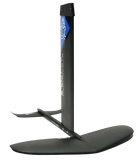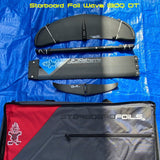The consistent, versatile wave-riding foil, for the lighter person on a faster wave. It’s stable, handles surface breaches smoothly and keeps a consistent speed. As a windsurf foil, it is a super-easy, early take-off foil that’s great for free-ride and freestyle foiling.
Specifications:
- Front Wing: Wave 1300
- Tail Wing: Wave 270
- Fuselage: 67cm
- Mast: Aluminium 65cm
- Mast: Deep Tuttle
Features:
Aluminium Mast: Starboard Aluminium masts use a proprietary and patent-pending triple I-beam cross-section with a unique profile that pushes more material to the perimeter than any other known masts, providing unprecedented stiffness and performance.
Deep Tuttle and Foil Box Compatible: The Starboard’s mast head is designed to fit into boards that have Deep Tuttle fin boxes with a sloped bottom inside. The elongated holes allow the bolts to rotate and adapt to both angles: parallel or tapered. The stainless steel nuts are oversized and deeply recessed into the head for maximum strength.
Aluminium Fuselage: For fuselage with a more square-shaped cross-section, aluminium has more suitable characteristics. Starboard’s choice of an aluminium fuselage makes Starboard foils stiffer, more controlled and more stable.
Wings: The thicker wings in the Wave series ensure optimum stiffness. Starboard use a foam core to reduce weight, and add some layers of glass to improve durability and impact resistance.
Sleeve Style Front Wing Connection: Starboard Wave foils use thicker wings that cannot fit a saddle system. So we created our own unique sleeve system that uses a parallel male ferrule. This design allows wings to be removed and swapped, quickly and easily. Two countersunk Torx bolts on the bottom and two more on top fully lock the wing in place.
Rocker Style Tail Wing Connection: Starboard Wave foil tail wings can adjust in angle by releasing the locking bolts and sliding the wing forwards or backwards along the rocker. Adjusting the tail wing allows Starboard Wave foils to fit different length boards, to match different speed and size waves, and finally different rider styles and body weights




